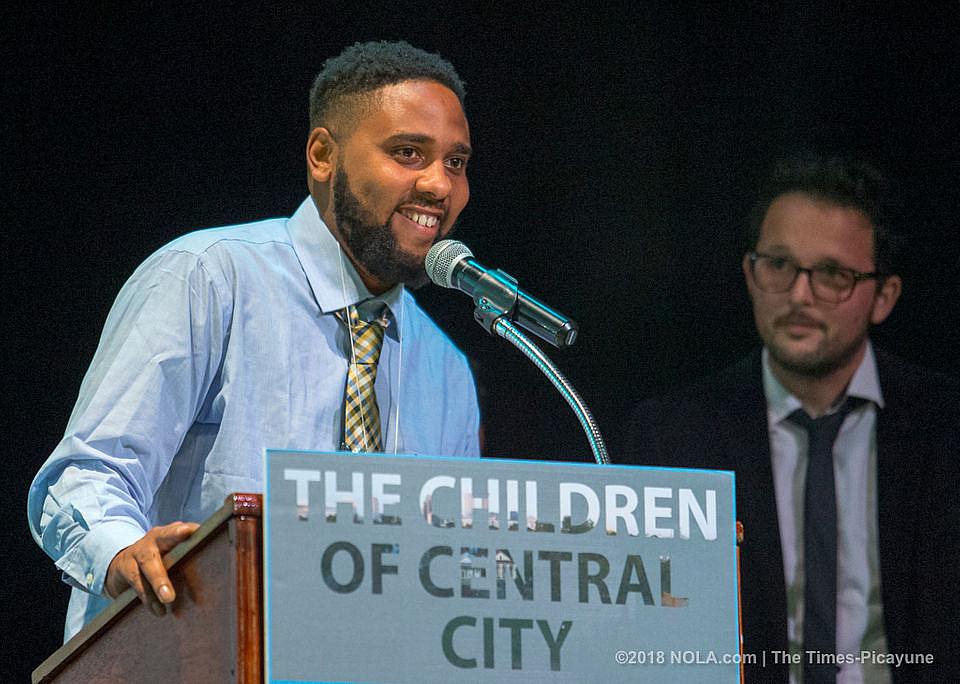City leaders call attention to 'Children of Central City'
This article was produced as a project for the Dennis A. Hunt Fund for Health Journalism, a program of the USC Annenberg Center for Health Journalism.

Photo by Brett Duke, NOLA.com | The Times-Picayune
By Greg LaRosa
City and community leaders gathered Monday night (July 17) for a panel discussion on how violence in New Orleans impacts its youth, a topic brought to the forefront in the recent NOLA.com | The Times-Picayune series of reports, "The Children of Central City." A documentary video that was part of the series was shown before the discussion at Ashe Cultural Arts Center.
For four months, reporters Jonathan Bullington and Richard Webster, photographer Brett Duke and videographer Emma Scott followed the Panthers, a youth football team based at A.L. Davis Park in Central City. Since 2003, 28 former members of the team have been killed. Dozens more have spent time in prison for drug offenses. "The Children of Central City" coverage examined how past and current Panthers have dealt with the consistent exposure to life-threatening conditions in their neighborhood -- and the absence of resources to help them cope.
New Orleans City Council members Jay Banks and Helena Moreno organized Monday night's documentary showing and panel talk, with backing from the United Way of Greater New Orleans. Moreno said she wanted to continue the community discussion the series of articles started about the trauma endured by children in crime- and violence-ridden neighborhoods.
Donna Edwards, wife of Louisiana Gov. John Bel Edwards and a former public school teacher, opened the event, urging those in attendance to mentor, volunteer and give support to organizations who assist children exposed to traumatic violence.
"You may not live in such a community," Edwards said, "but I can promise you that what happens there has a ripple effect on your community."
Mayor LaToya Cantrell ended the event with a "call to action," pledging that her administration would support programs that assist children affected by violence. She touted her newly created Office of Youth and Families, which she said would seek resources to fund such programs.
Cantrell said a reallocation of state taxes collected in New Orleans -- such as those levied through the convention and visitors' bureau, the convention center and Superdome -- should be considered to bolster local social services.
"It's not just infrastructure in the form of sewerage and drainage" that should be improved, Cantrell said. "It's the infrastructure in the form of investing in our human capital."
Former WDSU news anchor Norman Robinson moderated the discussion that included state Rep. Royce Duplessis, former Orleans Criminal Court Judge Calvin Johnson, Stacy Overstreet of the Tulane University Crime Prevention Institute, Denese Shervington of the New Orleans Trauma-Informed Schools Learning Collaborative, the Rev. Jamal Weathersby of New Hope Baptist Church and former Panthers team member Brennan Jacques.
Duplessis, who lives in and represents Central City, said that he heard gunfire on a recent night, leading him to question the impact of living in that environment on his newborn daughter. Lawmakers should avoid "violent policy" focused on punishment and instead consider what could be done to help children in at-risk environments.
Cantrell, who lives in Broadmoor, would later share a similar story about her 10-year-old daughter hearing gunshots Sunday night. Cantrell, who grew up in Compton, Calif., recalled visiting her father when she was 10 and seeing a man who was fatally shot.
"My father was angry. I thought it was me," the mayor said, explaining that she later would come to understand how that incident affected both of them.
Overstreet said the school system offers a venue through which support services could reach trauma-impacted children. Teachers and principals could be trained to help establish an environment where counseling and guidance are readily available, she said, appealing to the mayor and other officials to support such a program.
Weathersby said more attention must be devoted to violence and the associated trauma on families. He suggested campaigns at schools and churches, comparable to breast cancer awareness month in October, to give the subject a higher profile.
Jacques, who served five years in prison for a federal drug offense, is now a teacher and coach at Phyllis Wheatley High School. He said students who are coping with turmoil at home confide in him because they know he shares a similar background. "Our kids have a voice themselves," Jacques said. "We just have to listen to them."
Some 200 people packed the Ashe theater to view the 18-minute documentary. Moreno said additional showings are planned, stressing that the conditions detailed in the NOLA.com | The Times-Picayune series are prevalent in neighborhoods throughout New Orleans.
"This is impactful journalism," she said. "This is journalism that makes a difference."
[This story was originally published by NOLA.com | The Times-Picayune.]


